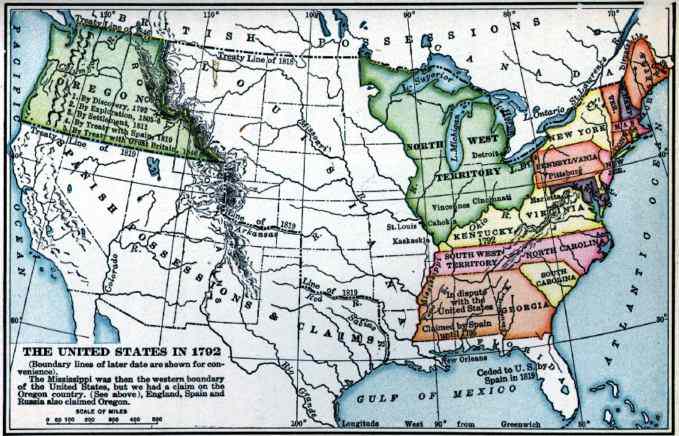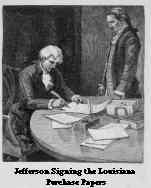Resource Center OLLibrary
Whenever our affairs go obviously wrong, the good sense of the
people
will interpose and set them right." --
JEFFERSON'S Writings.
THE DEMOCRATIC PARTY IN POWER
THOMAS JEFFERSON (DEMOCRAT)1
212. Jefferson's Administration (Third
President, Two Terms, 1801-1809); "Republican Simplicity"; the New
National Capital; Jefferson's Appointments to Office. The new
President 2 called himself a Democratic-Republican, or,
as we should say to-day, a Democrat (§ 203). He prided
himself on taking his stand with the people. In dress, manners,
and ideas he was quite different from the Federalist Presidents,
Washington and Adams. They both thought it proper for the head of
the nation to stand a little apart from the people; both were
opposed to monarchy, yet they
1 Reference
Books (Jefferson to J. Q. Adams, inclusive). A. B. Hart's
"Formation of the Union," ch. 9-12; W. C. Bryant and Gay's "United
States" (revised edition), IV, 145-291; E. Charming's The
Jeffersonian System"; K. C. Babcock's "Rise of American
Nationality (war of 1812, etc.); F. J. Turner's "Rise of the New
West A. B. Hart's "American History by Contemporaries," ch. 16-23;
A. B. Hart's Source Book," ch. 12-14; J. Schouler's "United
States," II, III, ch. 10-12; J. B. McMaster's "United States," II,
526-635; III, IV, V, 1-523. See also the classified List of Books
in the Appendix.
2 Thomas Jefferson was born 1743, at
Shadwell, Virginia; died 1826. He was a member of the Continental
Congress and drafted the Declaration of Independence; he also drew
up the Act of Religious Freedom adopted by Virginia through
Madison's influence in 1785. he proposed our present decimal
system of coinage and secured its acceptance. In 1785 he was sent
to France to succeed Franklin as minister of the United States. On
his tombstone is the following epitaph written by himself: "Here
was buried Thomas Jefferson, author of the Declaration of
Independence, of the Statute of Virginia for Religious Freedom,
and the father of the University of Virginia." The presidential
election of November, 1800, was a time of great excitement, and of
bitter strife between the Federalists and the Republicans (or
Democrats (§ 203)). Thomas Jefferson of Virginia and Aaron
Burr of New Jersey were the Republican candidates. Each received
73 electoral votes; while John Adams, the Federalist candidate,
got but 65. In such a case the House of Representatives -- a
majority of whom were Federalists -- had to decide the election;
they finally voted in favor of Jefferson, and he was declared
President, with Burr for Vice President. This period marks the
downfall of the Federalists; for the next forty years the
Democrats held control.
|
192 |
|
[1801 |
kept up something of the dignity and ceremony of a king.
Jefferson preferred, on the contrary, "republican simplicity" in
all things, and was ready to receive and shake hands with any one
and every one that wanted to shake hands with him.
Jefferson took the oath of office (§ 199)
in the new capitol, which was ridiculed as a "palace in the
woods." It stood on a hill in the "city of Washington" (§
199), then nothing but a straggling village of a few hundred
inhabitants. Washington, for whom it was named, had himself chosen
the ground for the city.
When Jefferson entered office he found only
Federalists (§ § 196, 203) in the employ of the
government. He naturally wished that men of his own party should
hold such offices, and when opportunities came he appointed
Democrats to fill them. From this time on, for many years, each
new President gave government employment to those who had voted
for him.
213. What was thought of the Probable Extent
of the Republic. Eminent men of that day thought it very
doubtful whether the American republic could permanently extend
into the wilderness beyond the Allegheny Mountains. Many agreed
with them, and believed that in time the country would be divided
into several nations. They thought it would be impossible for the
President to enforce the laws over a territory reaching from the
Atlantic to the Mississippi. When we consider that there were then
no steamboats, canals, or railways to bind the states together,
and in fact very few good ordinary roads, it does not seem strange
that men of sound judgment should have thought so.
214. What Our New Navy taught the Pirates of
Tripoli. For many years Tripoli and other towns on the north
coast of Africa had been nests of Mohammedan pirates. They sent
out fast-sailing armed vessels to capture the ships of Christians
coming to the Mediterranean to trade.
European nations had made repeated efforts to
break up this system of robbery, but had not succeeded. Even Great
Britain was obliged to pay the governors of Algiers and Tripoli
large sums of money every year in order to protect her commerce in
that quarter of the globe. We, too, felt obliged to buy the
good
|
1801-1803 ] |
|
193 |
will of these pirates. At one time we paid the ruler of Tripoli
$20,000 a year to let our merchant vessels sail the Mediterranean
in peace. Furthermore, we spent $1,000,000 in freeing American
sailors that were held as slaves in Tripoli. Part of this money
was given by the government and part of it was collected in the
churches on Sunday.
The Governor of Tripoli, disappointed because we
did not yield to his demands. and give him a still larger tribute,
declared war (1801) against the United States. Jefferson was a man
of peace, but he believed with Benjamin Franklin that "if you make
yourself a sheep, the wolves will eat you." He thought we had been
sheep long enough. The United States had recently completed
(1798-1799) a small fleet of first-class warships. They were
commanded by such men as Barry (§ 169), Bainbridge, Decatur,
Preble, and Truxtun. The President sent them out to Tripoli, and
they soon made the ruler of that place confess his sins and beg
for mercy.
The Pope declared that the Americans had done
more toward punishing the insolent power of the Mohammedan pirates
than all the nations of Europe put together. The Governor of
Tripoli was glad to make a new treaty (1805) with the United
States. He gave up asking tribute from us, and he agreed to let
our merchant ships and sailors alone in future.
215. Our First Step in National Expansion,
Purchase of Louisiana Territory, 1803. While this war with
Tripoli was going on, the greatest event of Jefferson's presidency
occurred. France had recovered possession of the province of
Louisiana (1800), including New Orleans (§ 143). Napoleon
Bonaparte, who was then about to engage in a tremendous contest
with England, was afraid that when war broke out the. English
would send over a fleet and take Louisiana out of his hands. For
that reason he was willing to sell it to the United States --
especially as the money would help him to fit out his armies
against Great Britain. In 1803, the year that Ohio entered the
Union, President Jefferson bought the whole territory of Louisiana
for $15,000,000. By so doing he got the very heart of the American
continent, reaching from the Mississippi back to the Rocky
Mountains. He thus, at one stroke, more than
|
194 |
|
[1803-1805 |
|
doubled the area of the United States, getting nearly
900,000 square miles, or over 560,000,000 acres, for less
than three cents an acre. (Map, p. 194.) |

NOTE. 1. Louisiana was part of the country claimed by Spain in 1540 (§§ 21, 22). 2. It was claimed by France in 1686 (§ 131). 3. France ceded it to Spain in 1762 (§ 143). 4. Spain ceded it back to France in 1800 (§ 215). 5. The United States purchased it
from France in 1803 (§ 215).
 There
were people who grumbled at the purchase. Some even
denied that Jefferson had the right to make it, -- but
the majority heartily supported the President. He himself
confessed that he had stretched his power "till it
cracked," in order to complete the bargain. In reality
Jefferson showed his statesmanship in the act. The
Purchase of Louisiana did these four things:
There
were people who grumbled at the purchase. Some even
denied that Jefferson had the right to make it, -- but
the majority heartily supported the President. He himself
confessed that he had stretched his power "till it
cracked," in order to complete the bargain. In reality
Jefferson showed his statesmanship in the act. The
Purchase of Louisiana did these four things:


